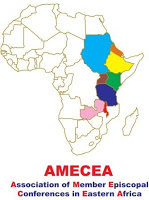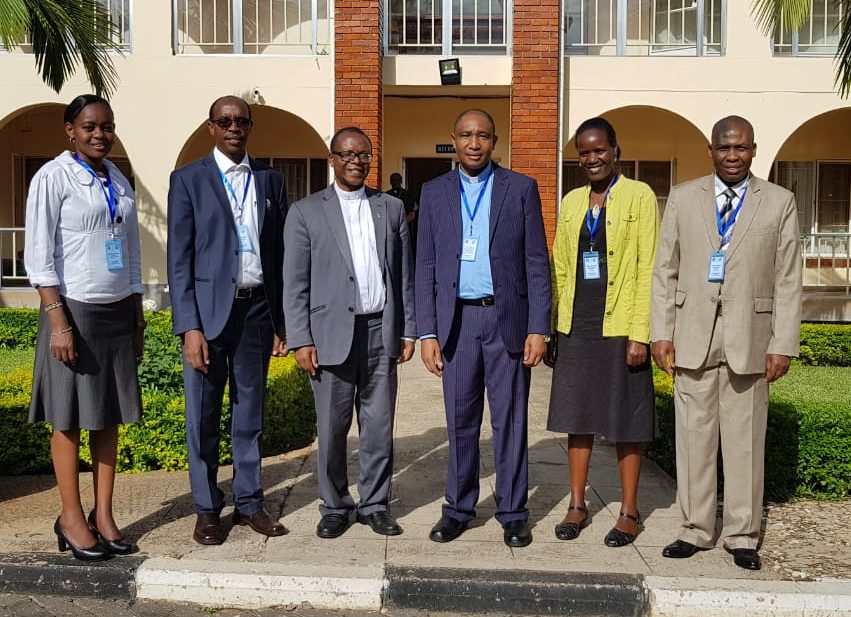AMECEA: Way forward for Capacity Building Project of AMECEA, CUEA & Missio Aachen

From December 2018 to March 2019, AMECEA in collaboration with Catholic University of Eastern Africa (CUEA), with support from Missio Aachen, have been conducting capacity building trainings for AMECEA Bishops and their close collaborators on Self-Reliance and Sustainability of the mission of the Church in the region.
The move according to Ms. Christine Mbugi AMECEA Capacity Program Coordinator, has been to empower bishops to embrace self-reliance and self-sustainability in their projects, owing to the dwindling financial support from partners and donor agencies.
So far the trainings have taken place in Ethiopia (December 2018) where 47 participants comprising of bishops, and their close collaborators benefited; Tanzania (January 2019) where 57 participants benefited, Zambia (February 2019) where 18 participants benefited; Uganda (March 2019) where 26 participants were trained; and finally Kenya also (March 2019) where 31 participants benefited.
AMECEA Online News interviewed Ms. Mbugi to explore what lies ahead for the program.
Online News: Five Conferences so far have benefited from the programme, what’s coming up next?

and AMECEA Capacity Building Program officer
Ms. Mbugi: We hope to get the dates for training for South Sudan and Sudan, Malawi and Eritrea as these are the Conferences remaining. After that we are looking forward to go to the second phase of trainings which will involve the financial administrators and project coordinators of the dioceses who are the close collaborators of the Bishops.
It is also good to note that when we are going to Conferences for the Bishop’s training, some Bishops were not available and so they sent their representatives in the personality of Vicars General or someone they choose to attend on their behalf. Therefore, the training was not purely for the Bishops alone but was more inclusive.
Online News: What stood out in terms of feedback from among those who have been trained?
Ms. Mbugi: So far the feedback is very positive. The Bishops appreciate the need of financial management, administration and self-sustainability and this is what they want to do for parishes and the institutions. In areas of human resource and financial administration management, there is a great need to put in place the required systems so that they may be able to do their work professionally and ethically in line with the law of the land.
Online News: Are there any Dioceses that are already implementing what the training is about?
Ms. Mbugi: Among the Conferences we have been to, there are quite a number of dioceses which already have the systems in place. There are also some dioceses that are more advanced in terms of self-sustainability; for example, the Archdiocese of Nairobi, which is a point of reference for many other countries. What is encouraged is to use those conferences and dioceses that are already doing well as points of reference for others that are trying to implement the same.
Online News: Any challenges and drawbacks that have been observed during the trainings?
Ms. Mbugi: The biggest challenge which has always come up during the trainings has been time factor. Due to lack of enough resources, we tried to incorporate a lot within very limited time. We have nine modules which have to be covered in four days meaning that the participants have to bear with the exhaustion that comes with it.
Online News: Previously the capacity building program was being conducted in collaboration with Catholic Universities in the region, of course together with CUEA as the anchor, has this changed?
Ms. Mbugi: Even though CUEA will be conducting the training, collaboration with universities from across the region will still continue and we require the conferences to give us resource persons who can tackle some of the modules based on the local context. Our CUEA trainers may not fully understand the human resource requirement in Eritrea or Taxation issues in Malawi or Labour laws in Zambia. We therefore need someone from the ground who understands the local context to come and join in and these will definitely come from the Catholic universities in the region.
Our next stage of training will be more detailed and will take at least two weeks at the end of which CUEA will issue a certificate of completion, which will be duly signed by the Chancellor and Vice Chancellor.
Online News: What are some of the major recommendations for the trainings from the bishops who have been trained?
Ms. Mbugi: The Bishops have been more interested in the practical aspect of what the modules are talking about. Therefore, we are working in collaborations with CUEA, which is our trainer to get more practical examples to share during the trainings.
The issue of time factor is also being considered and we are looking at how we can make it more practical and manageable for both the participants and the facilitators so that at the end of the day, we achieve our objectives.
It also been recommended that the exercise be incorporated in AMECEA Plan as a continuous exercise, not just a one-off training for the purpose of capacity building and empowerment.
∽End∽


